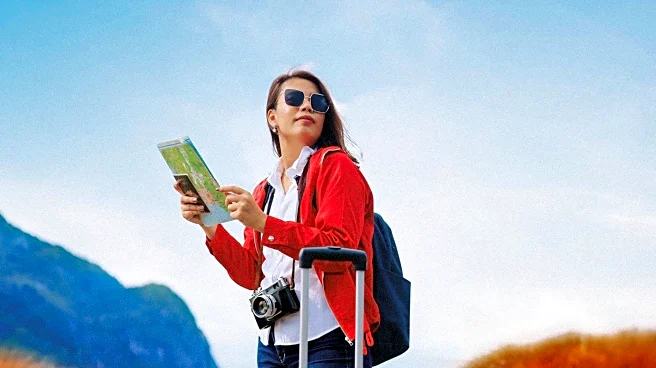What's Happening?
UK travel companies have observed a significant increase in solo travel bookings, particularly among older women who are seeking a break from work and family responsibilities. These travelers are opting for destinations that offer cultural immersion, such as Morocco, India, and Peru, as well as active walking or cycling trips in Europe. The trend is driven by women who value the freedom to explore on their own terms, often leaving partners behind. Travel operators specializing in group travel and 'soft adventure' activities, like hiking and canoeing, have noted that solo travelers now constitute a growing portion of their clientele. According to Explore Worldwide, two-thirds of people in an average group are traveling solo, with September and October being peak months for such trips.
Why It's Important?
The rise in solo travel among women reflects broader societal shifts towards individualism and personal empowerment. This trend has implications for the travel industry, which is adapting to cater to the needs of solo travelers by offering more tailored experiences. It also highlights changing dynamics in family and work life, where women are increasingly prioritizing personal fulfillment and exploration. The increase in solo travel bookings can lead to economic benefits for travel companies, as they develop new products and services to meet this demand. Additionally, it underscores the growing importance of cultural and experiential travel, which can foster greater understanding and appreciation of diverse cultures.
What's Next?
Travel companies are likely to continue expanding their offerings for solo travelers, with a focus on destinations that provide cultural enrichment and adventure. As the trend grows, there may be increased competition among operators to attract this demographic, leading to more innovative travel packages and experiences. The industry may also see a rise in marketing efforts targeting solo female travelers, emphasizing safety, independence, and cultural exploration. Furthermore, the trend could influence broader travel patterns, encouraging more people to consider solo travel as a viable option for personal growth and discovery.
Beyond the Headlines
The increase in solo travel among women may have deeper implications for gender roles and societal expectations. It challenges traditional notions of family and partnership, suggesting a shift towards greater autonomy and self-determination. This trend could also impact the way travel is perceived, with a focus on personal enrichment rather than conventional tourism. As more women embark on solo journeys, there may be a growing demand for travel experiences that prioritize safety and empowerment, potentially influencing industry standards and practices.











